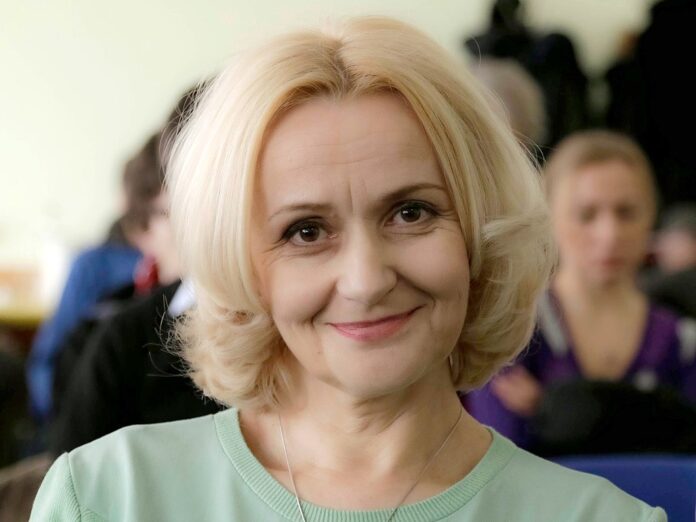Mourners honour former lawmaker Iryna Farion, who was fatally shot in Lviv, renowned for her staunch advocacy for the Ukrainian language and criticism of Russia
On July 22, 2024, several thousand mourners convened in Lviv, Ukraine, to pay their respects at the funeral of Iryna Farion, a former lawmaker celebrated for her fervent promotion of the Ukrainian language and outspoken criticism of Russia. Farion, 60, was tragically shot and killed on July 19, 2024, in her home city by an unknown assailant. The attack occurred in broad daylight, and despite immediate medical intervention, Farion succumbed to her injuries later in a hospital. Ukrainian authorities are treating the incident as a deliberate assassination and have launched a manhunt for the perpetrator, who remains at large.
Farion’s daughter, Sofia Semchyshyn, expressed profound grief and shock at the killing. “They killed her near her house during the day, on a sunny day,” she said, reflecting the harsh reality of the violence that has touched her family.
Embed from Getty ImagesIryna Farion served as a member of the Ukrainian parliament from 2012 to 2014. During her tenure, she was renowned for her advocacy for the Ukrainian language. She championed the use of Ukrainian over Russian and was vocal in her criticism of Russian-speaking Ukrainian officials and soldiers. Her views were particularly controversial during the early days of the Russia-Ukraine conflict, including her criticism of Russian-speaking members of Ukraine’s Azov regiment, who played a significant role in defending Mariupol.
The funeral, held in Lviv, was attended by thousands who came to honour Farion’s legacy. Among them was Olha Arden, 64, a local resident who praised Farion as a “patriot” and a “fighter for the Ukrainian language.” Arden, reflecting on Farion’s impact, said, “For me, she is a nationalist and the strongest fighter. For 32 years, she fought for the Ukrainian language. We respect and honour her. We will remember her after death.”
Farion’s death has sparked widespread mourning across Ukraine and renewed discussions about the ongoing conflict with Russia and the cultural identity of the Ukrainian people. Her legacy as a defender of the Ukrainian language and her critical stance against Russian influence have left an indelible mark on the national consciousness.
Analysis:
Political:
The assassination of Iryna Farion carries significant political implications, especially in the context of Ukraine’s ongoing conflict with Russia. Farion’s strong advocacy for the Ukrainian language and her criticism of Russian-speaking Ukrainians highlight the deep-seated cultural and political divisions exacerbated by the conflict. Her murder is likely to intensify anti-Russian sentiments and could galvanize political figures and the public to rally against perceived threats to Ukrainian sovereignty and identity. This event also underscores the vulnerability of political activists and cultural advocates in conflict zones.
Social:
Farion’s funeral and the reactions from mourners reveal the deep social impact of her work and her death. As a prominent advocate for the Ukrainian language, she symbolized a larger struggle for cultural preservation and national identity. The widespread attendance at her funeral and the tributes paid reflect her significant influence on Ukrainian society. Her death may lead to increased public discourse on issues of national pride, language, and the broader implications of cultural advocacy in times of conflict.
Racial:
While Farion’s case does not directly address racial issues, it intersects with ethnic and national identity. The conflict between Ukrainian and Russian-speaking populations in Ukraine often carries ethnic undertones, which can influence perceptions of loyalty and identity. Farion’s advocacy for the Ukrainian language and her stance against Russian influence can be seen as part of a broader struggle for ethnic and cultural self-determination in the face of external pressures.
Gender:
Farion’s role as a female politician in a highly polarized and male-dominated political landscape highlights the challenges faced by women in leadership positions. Her advocacy for the Ukrainian language and her vocal criticism of Russia demonstrate the intersection of gender and political activism. Her murder underscores the risks faced by women who challenge established power structures and engage in contentious political issues.
Economic:
The assassination of Farion and the associated political turbulence can have indirect economic impacts. Increased instability and violence can deter investment and disrupt local economies, particularly in conflict zones like Ukraine. Additionally, the heightened political climate following such events may influence government spending and resource allocation, particularly in areas related to security and public safety. Farion’s death could prompt a reassessment of economic priorities as the nation grapples with both internal and external challenges.
